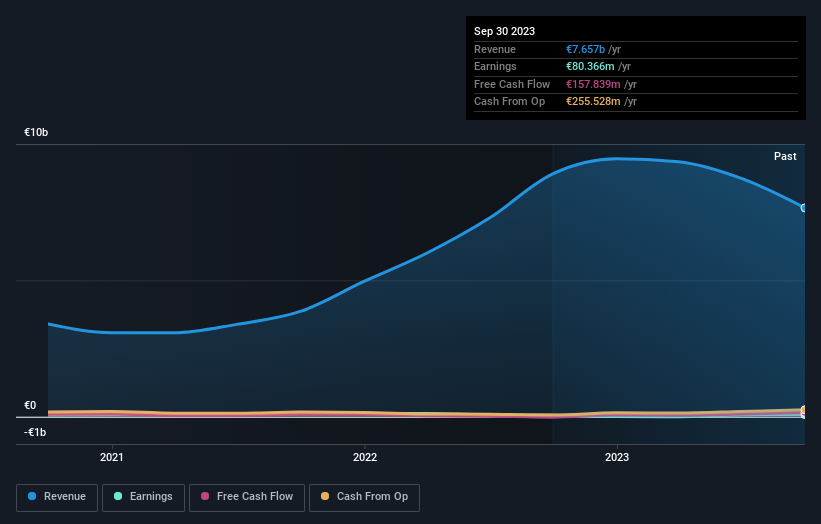Stock Analysis
- Slovenia
- /
- Specialty Stores
- /
- LJSE:PETG
Petrol d.d (LJSE:PETG) shareholders notch a 15% CAGR over 5 years, yet earnings have been shrinking

The main point of investing for the long term is to make money. Better yet, you'd like to see the share price move up more than the market average. But Petrol d.d. (LJSE:PETG) has fallen short of that second goal, with a share price rise of 51% over five years, which is below the market return. However, if you include the dividends then the return is market beating. Zooming in, the stock is up a respectable 11% in the last year.
The past week has proven to be lucrative for Petrol d.d investors, so let's see if fundamentals drove the company's five-year performance.
Check out our latest analysis for Petrol d.d
There is no denying that markets are sometimes efficient, but prices do not always reflect underlying business performance. One imperfect but simple way to consider how the market perception of a company has shifted is to compare the change in the earnings per share (EPS) with the share price movement.
During five years of share price growth, Petrol d.d actually saw its EPS drop 2.0% per year.
By glancing at these numbers, we'd posit that the decline in earnings per share is not representative of how the business has changed over the years. Since the change in EPS doesn't seem to correlate with the change in share price, it's worth taking a look at other metrics.
In fact, the dividend has increased over time, which is a positive. It could be that the company is reaching maturity and dividend investors are buying for the yield. The revenue growth of about 19% per year might also encourage buyers.
The image below shows how earnings and revenue have tracked over time (if you click on the image you can see greater detail).

This free interactive report on Petrol d.d's balance sheet strength is a great place to start, if you want to investigate the stock further.
What About Dividends?
It is important to consider the total shareholder return, as well as the share price return, for any given stock. The TSR is a return calculation that accounts for the value of cash dividends (assuming that any dividend received was reinvested) and the calculated value of any discounted capital raisings and spin-offs. It's fair to say that the TSR gives a more complete picture for stocks that pay a dividend. As it happens, Petrol d.d's TSR for the last 5 years was 102%, which exceeds the share price return mentioned earlier. The dividends paid by the company have thusly boosted the total shareholder return.
A Different Perspective
Petrol d.d provided a TSR of 19% over the last twelve months. But that return falls short of the market. On the bright side, that's still a gain, and it's actually better than the average return of 15% over half a decade This suggests the company might be improving over time. I find it very interesting to look at share price over the long term as a proxy for business performance. But to truly gain insight, we need to consider other information, too. Case in point: We've spotted 1 warning sign for Petrol d.d you should be aware of.
If you are like me, then you will not want to miss this free list of growing companies that insiders are buying.
Please note, the market returns quoted in this article reflect the market weighted average returns of stocks that currently trade on Slovenian exchanges.
Valuation is complex, but we're helping make it simple.
Find out whether Petrol d.d is potentially over or undervalued by checking out our comprehensive analysis, which includes fair value estimates, risks and warnings, dividends, insider transactions and financial health.
View the Free AnalysisHave feedback on this article? Concerned about the content? Get in touch with us directly. Alternatively, email editorial-team (at) simplywallst.com.
This article by Simply Wall St is general in nature. We provide commentary based on historical data and analyst forecasts only using an unbiased methodology and our articles are not intended to be financial advice. It does not constitute a recommendation to buy or sell any stock, and does not take account of your objectives, or your financial situation. We aim to bring you long-term focused analysis driven by fundamental data. Note that our analysis may not factor in the latest price-sensitive company announcements or qualitative material. Simply Wall St has no position in any stocks mentioned.
About LJSE:PETG
Petrol d.d
Petrol d.d., through its subsidiaries, sells petroleum and other energy products in Slovenia and internationally.
Excellent balance sheet established dividend payer.

